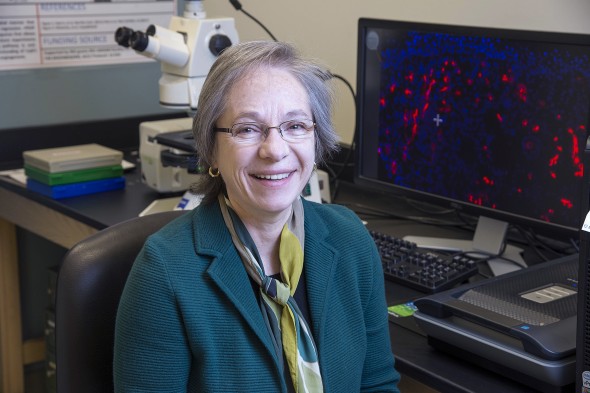Drawing on personal experience to improve wound healing
A serious bicycle accident that resulted in multiple fractured teeth and severe lacerations to her face led Luisa DiPietro to become one of the country’s leading wound healing experts.
When she looked in the mirror after the accident, DiPietro — then a college sophomore — did not recognize the person staring back at her. At times, she thought she would be disfigured for the rest of her life. But with the help of modern dentistry and excellent surgeons, her face healed completely and her smile was restored.
More than 6 million Americans develop severe problems with wound healing each year. DiPietro and her colleagues are developing therapies that will allow humans to regenerate perfect tissue after an injury.
Her research, which compares healing in the oral mucosa to that of the skin, has shown that injured tissue in the mouth repairs with less inflammation and more new blood vessels.
“Figuring out how to make skin on the rest of the body act more like the mouth could mean an end to disfiguring scars,” said DiPietro, director of the Center for Wound Repair and Regeneration in the UIC College of Dentistry and a 2015 University Scholar.
DiPietro majored in biology at the Urbana campus, with a doctoral degree her goal. During the long hours of treatment after her accident, she became fascinated with the dental profession and applied for a summer research fellowship at the Medical College of Georgia (now Augusta University) College of Dentistry.
After graduating from UIUC, she chose to study dentistry at UIC. But she remained involved with her first love — research — during dental school. After she began her practice, she eventually returned to UIC to earn a Ph.D. in immunology.
Not surprisingly, DiPietro became interested in the role immune cells play in wound healing and regeneration. After receiving her Ph.D., she accepted a postdoctoral fellowship at Northwestern University and joined a group of scientists active in the field.
“Understanding the molecular and cellular aspects of wound healing has been my life’s work, and most days I still can’t believe I am being paid to engage in such an exciting area of research,” said DiPietro, professor of periodontics in the College of Dentistry and associate vice chancellor for research.

